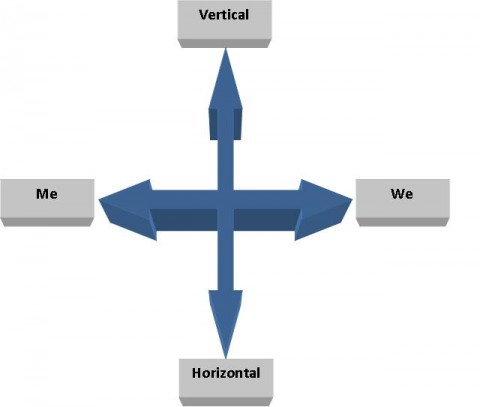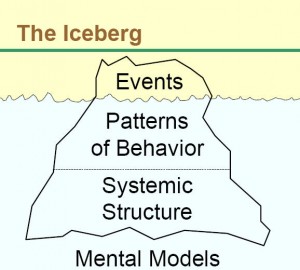How Vertical Are You?
September 26, 2012 4 Comments
I want to tip my hat to mentors and thought partners, both near and far, for fueling my thinking around the topic of this post – thanks to Carol Sanford, Richard Hawkes and Tom Lombardi at Growth River, Glenda Eoyang, Richard Barrett, and my IISC colleague Gibran Rivera. There is much discussion in the social sectors these days about the need to be more fearless, to take risks, to fail early, to be innovative and vulnerable. Influenced by my colleagues, I like to frame all of this as being about our need to think and act more “vertically,” that is, with an evolutionary thrust, in the direction of personal and systemic growth and development, opportunity generation, and a sense of accountability to a greater community or “we.”
On the flip side, times of crisis and uncertainty can fuel our fear-full side, the tendency to pull back and think more about individual (and perhaps collective) survival, and drive a focus around conserving what we have. This might be framed as a tendency to think and act more “horizontally.” While one or the other is not inherently better or right (we need both), here’s the thing – in most cases, a team, organization, or community cannot be more vertical/evolutionary than the thinking of its formal leadership, and certainly will not get more vertical than the overall orientation of the system as a whole. Furthermore, being too horizontal for too long means simply surviving (not thriving) and ultimately results in stagnation and irrelevance.
So this means that it behooves leadership to be aware of and/or intentional about:
- its own current degree of verticality
- where it needs to be to move forward given contextual factors and desired future state; and
- creating conditions that help bring more of the system for which it assumes some degree of stewardship, into alignment.
Verticality can manifest at different systemic levels (see Iceberg Diagram above), including mindset/beliefs, structure (policies, role differentiation), strategic practice/patterns of behavior. So what do you think? How vertical are you (individually and/or collectively)? How vertical do you need to be and where? How might you get there?

4 Comments
I appreciate how you named the dynamic of how, in the face of fear, we focus more narrowly on our own survival. Our big challenge is the flawed mental model that assumes our own survival is somehow separate from the health of the larger systems we are embedded in.
I like the concepts in the model; however the words vertical and horizontal do not resonate for me. For me, images that naturally come to mind for evolution are moving forward down a road or a spiral of transforming into a healthier state. How about ‘aspirational’ for vertical and ‘conserve’ or ‘maintain?’
Curtis – thank you for inviting us to gauge our work this way. As you know, from so many of our conversations, this is a frame that I work with at a personal level as well as in my approach to our work. The possibility of aligning with an evolutionary thrust that is so much bigger than us begins to provide a new sort of inspiration for movement and progress in a way that also releases us from our petty selves and all of the personal neuroses that we get so preoccupied with. The “we” is much greater than the sum of its parts.
Beth – I appreciate where you are coming from, but I like the idea of vertical because it speaks to stage development and it clearly values a higher stage of consciousness over a lower one. The frame invites us to grapple with hierarchy.
Thanks for this. A good reminder of the incessant pull of the status quo and the tyranny of the urgent. Reminds me of a Carl G Jung quote: “The greatest and most important problems of life are all fundamentally insoluble. They can never be solved but only outgrown.”
Thanks for the comments, all! With respect to the terminology “vertical,” I wanted to add that the spirally effect that you mention, Beth, I see as coming from a dynamic interplay of the vertical and horizontal. Aspirational does not cover it for me, either, because it is not strong enough, and doesn’t align for me with the very real trajectory of life. I know others have negative reactions to the vertical because of its implications of hierarchy, but I want to push back and say that hierarchy exists in nature, not necessarily in the value-laden way we have created in the human social world, but in a functionally systemic way. Loving the conversation.